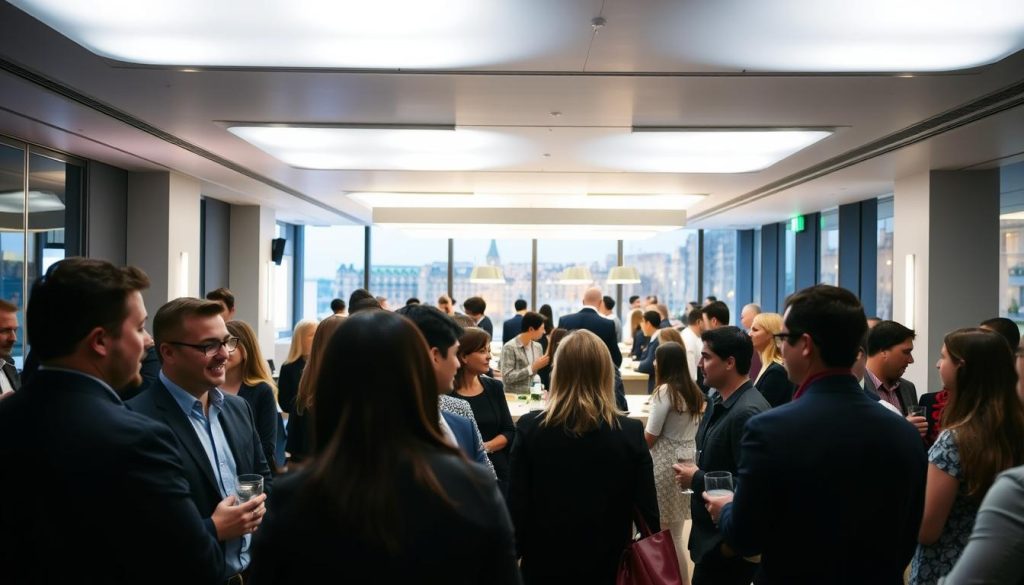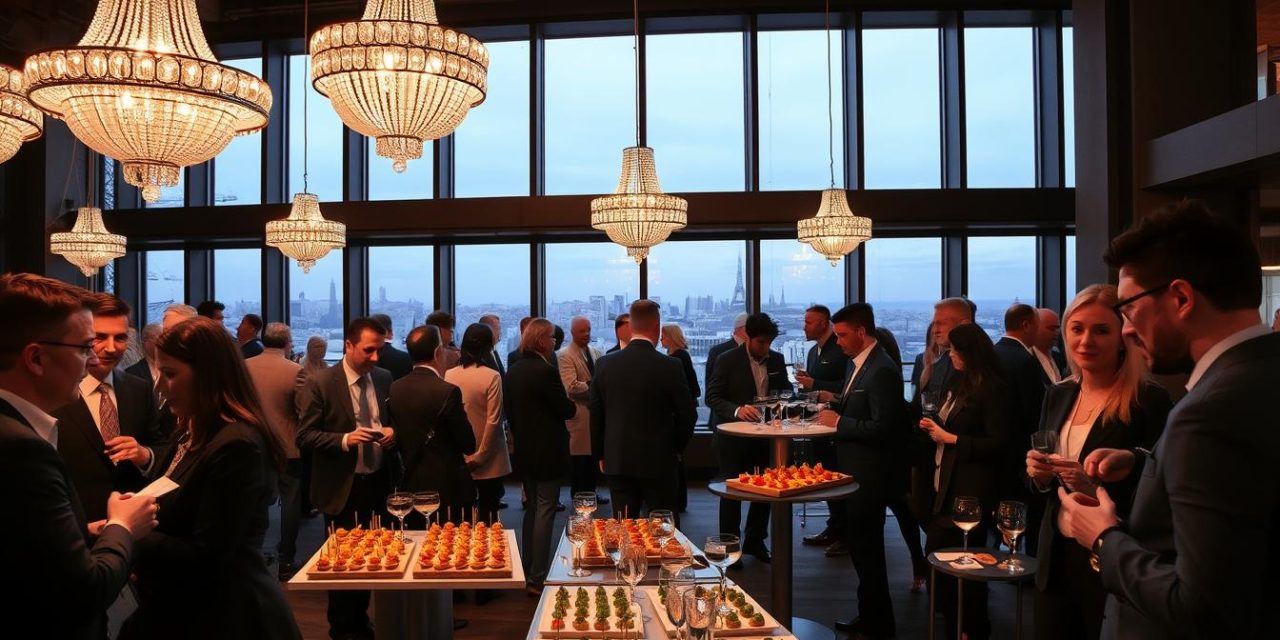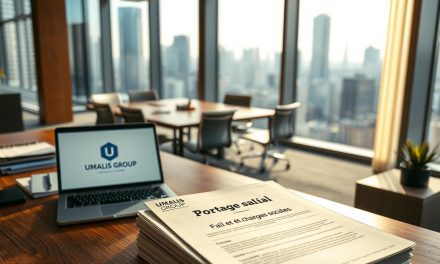We begin with a simple story: a software engineer from Lisbon arrived in Lyon with a small résumé and a clear goal — to meet people who could open doors. At Sido Lyon she found founders and researchers in AI and robotics. A brief conversation led to a pilot project the next month.
That moment shows how focused preparation turns an hour into a long-term win. Lyon’s scene—from Pollutec and Sirha to Forum Rhône-Alpes and university workshops—gives you targeted rooms and reliable people.
We will show how to use these gatherings to advance your career and build useful contacts. Expect practical steps on choosing the right event, meeting the right professionals, and capturing clear information afterward.
Table of Contents
Key Takeaways
- Use Lyon’s diverse programs (Sido, Pollutec, Sirha) to target industry-specific opportunities.
- Prepare concise goals to make each event yield measurable progress for your career.
- Leverage university workshops and FrenchTech meetups to expand skills and contacts.
- Prioritize structured formats—panels and workshops—for higher-quality conversations.
- Capture information on the spot and follow up with calm, professional messages.
Why Networking Matters in France Today
A single well-placed conversation in a French conference room can create referrals, pilots, or job interviews within weeks. Personal meetings still lead the market. Keynotes and roundtables open pathways to meaningful dialogue.
Decision-makers in France expect punctuality, clarity, and follow-through. Preparation — researching agendas and attendees — raises your credibility and increases the chance of a real opportunity.
From contacts to collaborations: the real ROI
Depth beats breadth: a few informed talks at the right venue produce better career outcomes than many shallow introductions.
- Use keynotes as conversation starters and roundtables for expert positioning.
- Capture information on hiring timelines, priorities, and pain points.
- Aim for one measurable outcome per event — a pilot, referral, or interview.
Understanding French business culture and face-to-face expectations
Trust builds slowly. Respect schedules, present clear value, and follow up with concise information. We recommend a short checklist: agenda, attendee scan, positioning statement, and follow-up templates.
| Format | Best for | Behavior to adopt |
|---|---|---|
| Roundtable | Positioning as an expert | Prepare 2 insights; ask focused questions |
| Conference | Market trends and leads | Select sessions; target 3 contacts |
| Recruitment fair | Career moves and hiring timelines | Bring concise CV; schedule follow-ups |
For a practical checklist and tips on freelance outreach in France, see our guide on effective freelance outreach.
The Networking Landscape in France: Lyon as a Model City
In Lyon you can test your positioning quickly and meet decision-makers across tech and sustainability.
Building your network as an international professional in Lyon
Lyon is a high-density arena where internationals reach founders, product leaders, and public stakeholders with few steps.
Start at flagship gatherings such as Sido Lyon for deep tech and FrenchTech meetups for founders and investors.
Integration benefits: cultural nuances and business practices
Local norms reward punctual, agenda-driven conversations and concise follow-ups.
Adopt one clear offer — a pilot, audit, or case study — so experts can evaluate next steps fast.
High-profile hubs: Sido Lyon, TUBÀ, and FrenchTech meetups
- Use TUBÀ to connect public authorities, researchers, and companies for cross-sector collaborations.
- Validate ideas at small meetups, then scale validation at major forums like Forum Rhône-Alpes.
- Keep a simple tracker: who you met, what they need, and the promised next step.
« Test fast, iterate often — Lyon lets you convert short conversations into concrete business collaborations. »
For related planning and a Paris comparison, see our guide to networking opportunities in Paris.
Types of Networking Events You’ll Find
Each format—conference, fair, or workshop—acts as a distinct path to new opportunities. Choose the format that matches your goal: discovery, validation, or conversion.
Industry-specific conferences and roundtables
Sido Lyon and Pollutec gather buyers, press, and senior professionals in focused sectors. Conferences speed discovery; roundtables allow curated, deeper exchanges with decision-makers.
Career fairs and recruitment forums
Forums such as Forum Rhône‑Alpes compress hiring cycles. You can compare roles, present a concise CV, and book follow-ups with multiple employers in a single day.
Workshops and university training
Short courses at places like Claude Bernard University deliver applied knowledge fast. These workshops are ideal for showing practical skills and building trust with peers and faculty.
Informal meetups and happy-hour gatherings
Groups such as FrenchTech Lyon, Lyon Tech Meetups, TUBÀ, and coworking spaces offer relaxed settings. Casual meetings often reveal candid insights you won’t hear in formal sessions.
Virtual formats
Webinars, video conferences, and online expos remove geographic limits. Use virtual formats to test your message and schedule real meetings before you travel.
| Format | Best use | Typical outcome |
|---|---|---|
| Conference (Sido, Pollutec) | Market discovery and trend scanning | New leads, press contacts, broad visibility |
| Roundtable | Expert positioning and validation | Strategic introductions, pilot discussions |
| Career fair (Forum Rhône‑Alpes) | Recruitment and role comparison | Interviews, hiring timelines, follow-ups |
| University workshop | Skills growth and peer credibility | Short-term training certificates, faculty contacts |
| Informal meetup / coworking | Casual introductions and market feedback | Candid insights, quick referrals |
Practical tip: Treat each format as a funnel stage and keep a one-page summary for each meeting. For a practical reference, see our networking guide.
How to Prepare for networking events

A short, well-structured plan before you attend makes every conversation count. Start by researching the agenda, speakers, and attendee list. That background lets you craft specific openers and collect useful information on priorities in the sector.
Research attendees, agenda, and sector focus
Identify three people or organisations you want to meet. Read recent press or LinkedIn posts so your questions are current and relevant.
Set clear goals and choose the right format
Define one measurable aim: a pilot, referral, or interview. Pick the format that matches that aim—roundtables for depth, large conferences for discovery, virtual sessions for quick testing.
Dress code, cards, and digital contact options
Be practical and polished. Align attire to the sector. Bring physical business cards and a digital option (QR or vCard) so you can exchange contact details fast.
- Prepare a 30–60 second pitch and practise it aloud.
- Set a target of three priority conversations and a 48‑hour follow-up window.
- Bring a one‑page summary or portfolio link to support your next steps.
Mastering Your Pitch and First Impressions
Preparation makes your first 30 seconds count when you meet new professionals.
A solid method beats improvisation. Treat your pitch as a designed asset: plan structure, wording, and delivery in advance. This reduces cognitive load and helps you stay concise.
A simple framework that works
Use a short arc: who you help, the problem you solve, how you do it, and a crisp example. This gives professionals quick context in under a minute.
Crafting two practical variants
Calibrate tone to the room. Prepare a conference version for noisy, crowded halls and a roundtable version for slower, expert-led conversations.
| Pitch Variant | Length | Focus | Proof Point | Close |
|---|---|---|---|---|
| Conference | 20–30 sec | Outcome and scale | Client result (metric) | Offer 15‑min call |
| Roundtable | 40–60 sec | Technical approach | Case study summary | Suggest quick demo |
| Virtual / Hybrid | 20–40 sec | Clear ask | Certification or award | Send follow-up link |
Lead with listener outcomes—time saved, risk reduced, or revenue gained. Keep eye contact, an open stance, and a warm tone to strengthen presence in face-to-face meetings.
Anchor with one proof point and close with a simple next step. Rehearse aloud, record and refine after two or three sessions. Use feedback from your network to tighten wording and increase conversion.
In-the-Room Strategy: Engage, Listen, and Add Value
Choose a few focused conversations over many brief hellos to make real progress in the room.
Prioritize small-group or one-to-one talks where you can listen deeply and offer concrete value. These moments let you map needs and propose a specific next step that feels natural.
Small-group focus vs. trying to meet everyone
Quality beats quantity. A targeted meeting increases the chance of a follow-up pilot or referral.
Reserve energy for three priority conversations and protect time to note details immediately after each exchange.
Active listening, eye contact, and topic starters
Lead with keynote themes or recent trends as openers; this shows you read the room and respect the organiser’s agenda.
Demonstrate active listening: paraphrase, ask clarifying questions, and link their needs to practical solutions.
Common mistakes to avoid during conversations
Avoid hard-selling, checking your phone, or dominating the discussion. These behaviours erode trust fast.
Instead, share a short resource on the spot and ask permission for a clear next step— »Would a 15-minute walk-through next week help? »
| Action | Why it works | Practical tip |
|---|---|---|
| Focus on small groups | Enables depth and context | Target 3 priority people; take notes after each talk |
| Use keynote insights | Signals preparation and relevance | Reference a speaker point to start the meeting |
| Ask for a specific next step | Keeps momentum and clarity | Propose a 15‑minute demo or call within a week |
Capture names, roles, and interests right away and close loops within 48 hours. Introducing complementary professionals increases your reputation and builds collaborations that last.
Follow-Up That Converts Contacts into Opportunities
After a meeting, the next 48 hours decide whether a contact becomes a project. Prompt, clear follow-up shows professionalism and keeps momentum.
Personalize every message. Reference a specific point you discussed. A short note that names the idea or problem you shared proves attention and builds trust.
Personalized messages referencing shared discussions
Send a brief tailored note within 24–48 hours. Mention the exact topic, one insight, and one clear next step.
LinkedIn connects, coffee chats, and next-step scheduling
Connect on LinkedIn with context—one sentence about where you met and a suggested 15‑minute call or coffee. Propose a single practical action: share a one‑pager, set a demo, or introduce a colleague.
- Keep emails short with one ask; respect the recipient’s inbox.
- Track contacts in a simple CRM or spreadsheet: name, promise, deadline.
- Send a resource that matches their priority to add immediate value.
| Action | Timing | Purpose |
|---|---|---|
| Tailored email | 24–48 hours | Confirm understanding; propose next step |
| LinkedIn message | Within 48 hours | Maintain contact; schedule short call |
| Resource share | When relevant | Build trust; show expertise |
| Follow-up for hiring | 48–72 hours | Summarize value and availability |
If timing isn’t right, ask permission to check in later. That keeps the relationship alive without pressure. Treat follow-up as a core part of your system: consistent execution turns brief meetings into lasting opportunities.
For templates and a practical checklist on next steps, see our follow-up guide.
Where to Find Events in France Right Now

Plan your calendar around Lyon’s flagship programmes to maximise opportunities and highest-value contacts.
Sido Lyon gathers IoT, AI, and robotics leaders — ideal for tech partnerships and pilot projects. Pollutec is a four-day environmental and energy exhibition with 11 themed areas and visitors from 110+ countries, useful for sustainability markets. Sirha runs five days focused on food, hotel, and catering; you’ll meet buyers, chefs, and procurement leads.
Local meetups, accelerators, and calendars
Follow FrenchTech Lyon and Lyon Tech Meetups for frequent meetups with founders, product leaders, and investors. TUBÀ programmes cover smart city pilots and public-private innovation. Coworking spaces publish rolling calendars with talks and demo days that often lead to targeted introductions.
Hiring intel and practical learning
For job discovery, monitor Forum Rhône‑Alpes and university career pages. Claude Bernard University and similar institutions run short workshops that combine practical knowledge and peer connections.
- Combine in-person and virtual activity; register early to secure meetings with speakers or exhibitors.
- Keep a simple monthly tracker: name, date, registration link, and your primary objective.
- Send short, event-specific messages to request meetings and close the loop with at least one follow-up.
Consistent planning and focused attendance turn discovery into career progress.
Conclusion
Small, focused actions before and after an event produce long-term professional returns. Treat each interaction as a planned step toward a clear outcome: a pilot, interview, or client meeting.
Apply the Lyon playbook—targeted formats, tidy preparation, and disciplined follow‑up—and you can replicate results across France. Prioritize depth over volume and blend virtual and in-person activity to keep momentum year‑round.
Build a simple rhythm: monthly planning, weekly outreach, and 48‑hour follow-ups. Protect your energy by choosing only those events that map to your goals.
For practical guidance on business development and expanding your reach in France, see our guide on business development in France. With a calm system and steady execution, each meeting becomes a predictable part of your career growth and job opportunities.
FAQ
What are the main benefits of attending professional gatherings in France?
In-person meetings let you build trust faster, meet decision-makers, and discover collaboration or job opportunities. They also provide market insights, access to industry experts, and a chance to practice your pitch in real conditions. For independent professionals, these forums accelerate visibility and credibility.
How does French business culture affect face-to-face interactions?
French professionals value formality, clear titles, and punctuality. Conversations often start with polite small talk before moving to business. Showing respect, using a concise introduction, and following established etiquette increase your chances of a productive follow-up.
How can an international professional integrate into Lyon’s professional scene?
Start by researching local meetups and sector-specific gatherings. Learn basic French business phrases, attend bilingual sessions, and connect through hubs such as FrenchTech Lyon or coworking spaces. Regular presence and cultural curiosity help you build trust and local referrals.
Which types of gatherings are most useful for career growth?
Choose formats aligned with your goal: conferences and roundtables for visibility, career fairs for hiring opportunities, workshops for skills, and informal meetups for relationship building. Virtual sessions remain useful for maintaining contacts across regions.
How should I prepare before attending a meeting or conference?
Research speakers and attendees, set two concrete goals (e.g., three qualified contacts, one follow-up meeting), prepare a short pitch, and organize contact methods (business cards and a clean LinkedIn profile). Dress appropriately for the sector and bring a notepad for immediate notes.
What makes a strong, memorable pitch?
Be concise, specific, and benefit-focused. State who you are, what you offer, and a clear value proposition in 30–45 seconds. Use a practical example or metric to illustrate impact and end with a single call-to-action, like proposing a coffee or a quick demo.
How do I balance meeting many people versus deepening a few relationships during an event?
Prioritize quality over quantity. Identify three high-value contacts to pursue deeply, and allow time for short introductions with others. Small-group conversations often yield stronger outcomes than brief exchanges with many attendees.
What common mistakes should I avoid while networking?
Avoid dominating conversations, overselling without listening, and failing to follow up. Also, don’t neglect punctuality or ignore cultural norms. Professional courtesy and active listening create better long-term connections.
What’s an effective follow-up strategy after a meeting?
Send a personalized message within 48 hours referencing a specific point from your conversation. Propose a clear next step (call, coffee, or shared resource) and connect on LinkedIn with a tailored note. Keep follow-ups concise and action-oriented.
Where can I find current gatherings and sector programs in Lyon?
Track calendars for Sido Lyon, Pollutec, and Sirha for major industry fairs. Monitor FrenchTech Lyon, local Meetup groups, and coworking space event pages for regular sessions. University and professional association boards also list workshops and recruitment forums like Forum Rhône-Alpes.





